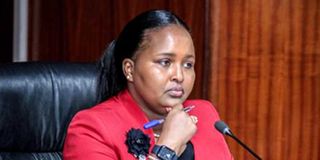MPs’ tough questions on Ruto varsity funding plan

Samburu West Mp Naisula Lesuuda on November 30, 2023.
What you need to know:
- MPs, led by Naisula Lesuuda, want to know the effectiveness of the model.
In addition, the lawmakers want the ministry of education to demonstrate efforts being put in place to enlighten parents, guardians and students over how the model operates.
Members of Parliament are now demanding answers to five critical questions regarding President William Ruto’s new university funding model.
In a statement sought on the floor of the House by Samburu West MP Naisula Lesuuda, lawmakers want to know the effectiveness of the model, analysis of the beneficiaries since inception and a report showing equitable sharing of the fund since it was established.
In addition, the lawmakers also want the Ministry of Education to demonstrate the systematic challenges that have bedevilled the system and efforts being put in place by the government to enlighten parents, guardians and students over how the model operates.

State Department for Higher Education and Research PS Beatrice Inyangala when she appeared before the National Assembly Committee on Education on June 4, 2024.
The National Assembly committee on education has already summoned Principal Secretary Higher Education and Research Beatrice Inyangala and the University Funding's (UF) management to appear before it on Thursday next week to provide answers to the questions raised over the model.
“Concerns have emerged regarding the effectiveness of this new funding model. There is widespread anxiety among students and parents about its application,” Ms Lesuuda said.
She pointed out that the categorisation of students into bands has raised fears about access to funding by needy students.
The lawmaker also expressed concern that currently, public universities are facing debts and budget deficits, casting doubt on the ability of the model to address systematic challenges while maintaining equitable access to higher education.
Question of fees and needy children
She wants a report on the application of the new funding model on public universities and TVETs, including analysis and categorisation of the beneficiaries in the five bands, to ensure that it does not disadvantage the most needy.
The PS will also be required to provide a clear breakdown of universities' fees, specifying what will be payable by parents and the amount to be offset through government funding.
“What are the safeguards in place to ensure that the model does not roll back the gains made towards realising 100 percent transition from secondary to university and TVET education?" The MP posed.
“What are the measures put in place to ensure the high fees indicated in the university admission letters do not bar needy students from admission to public universities including public sponsored students admitted in private universities,” she added.
National Assembly Education Committee chairman Julius Melly said they are seized of the matter and that they seek all answers on Thursday.
“As a committee we are seized of the matter and we have already invited PS Higher Education, the CEO University funding board and CEO Higher Education Loans Board to our committee on Thursday,” Mr Melly said.
Second year of implementation
The new model is currently in its second year of implementation. It has faced a number of challenges including late disbursements from the National Treasury to the Higher Education Loans Board (HELB) and the University Fund.
By May, Treasury had not remitted Sh29 billion to both University Funding and HELB. The amounts include Sh7.9 billion for scholarships for first year students under the new funding model and Sh4.2 billion towards scholarships to TVET students
The funding model categorises applicants into five bands: band one comprises students from households whose monthly income is below Sh5,995. Band two are those from families with a monthly income of Sh5,995 to Sh23,670 while band three comprises those from households earning Sh23,671 to Sh70,000. Band four has students from households with Sh70,001 and Sh119,999 monthly income while those earning Sh120,000 are classified under band five.
The government support is through scholarships that are awarded by the University Fund while loans are given out by HELB.
Whereas students will not be required to pay back the scholarship awarded, the loan will be payable upon graduation
Students who will join university and colleges next month have been applying for the funding with results on the amounts they have been awarded expected from Wednesday next wee, just a day before the PS faces MPs.
The 2023 KCSE candidates are expected to join university in August and September.
New fee structure
Last month, MPs had directed the ministry of education to re-issue new fee structures to university students, indicating only the amount parents are expected to pay minus government loans.
Lawmakers complained that the current fee structure issued, indicating the full amount, has scared parents and demoralised students, with some opting out due to the high amounts expected from them.
The MPs also told the ministry to only indicate what parents are expected to pay in a semester and not put a lump sum amount of the entire course, which they say has caused agony among parents and students.
In a meeting with PS Inyangala, the National Assembly committee on education resolved that the new fee structure should be issued before July 31 to enable parents prepare adequately.
Recently, students and parents were shocked by the high fees indicated in admission letters issued to them by various universities.
The meeting comes amidst budget cuts across all government departments and ministries.
The education committee, however, managed to convince the Budget and Appropriations committee to increase the budget to the Higher Education and Research department, which saw the allocation increased by Sh1.15 billion from the initial allocation of Sh119 billion to Sh120 billion.
The money will go to HELB, whose budget had been reduced by Sh710 million, and the University Fund whose budget had been cut by Sh2.6 billion from the original allocation of Sh19.6 billion.





